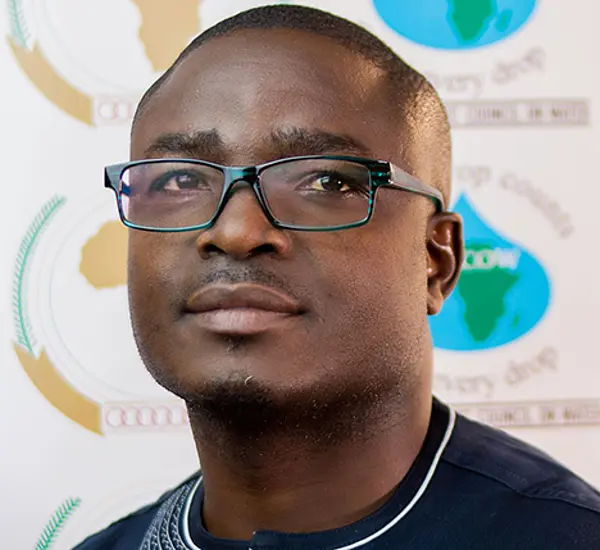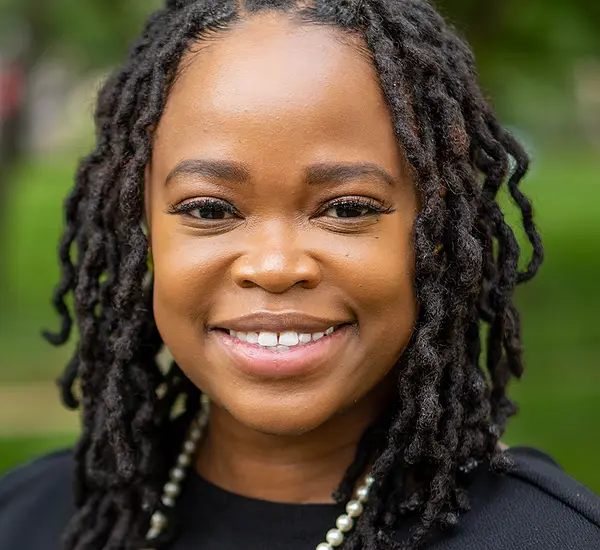Earlier this fall, RTI joined other leading voices and technical experts at UNC’s Water and Health Conference.
Held annually in Chapel Hill, North Carolina, the UNC Water and Health Conference is intended to convene policymakers, practitioners, and researchers to review current evidence and science to improve old approaches and develop new strategies approaches to expanding WASH access.
The conference is always a focal point given its relevance to RTI’s water resources work—yet this year marked an unprecedented milestone, with all members of the International Development Group’s water team in attendance. Taking advantage of this robust representation, we sat down to gauge reactions. With some seasoned experts and others relative newcomers to the WASH sector, each member of the team came away with a unique take on this year’s discussions—yet one consensus was unanimous: the global focus on WASH as a critical component of climate change, is long overdue, and much work remains to be done if we are to make lasting change for both this sector and the future of our planet. Read some first-hand accounts of the UNC Water and Health Conference below:

I was surprised and heartened to see how seriously the developed world is finally taking WASH issues, both as a critical measure of human development and as a crucial enabler of economic development. Presentations on case studies, best practices, innovations, and tools for addressing WASH challenges were shared in a manner that elevates WASH to its rightful place in the societal development matrix. It’s clear that WASH is the next frontier for development diplomacy—especially in Africa where RTI is already impacting lives.

It was great to see such a broad variety of international participants—Ethiopia, Kenya, Ghana, Haiti, Cambodia, Switzerland, Canada, Madagascar, Peru, UK, U.S., etc.—and to hear what they shared about accomplishments—learning about market-based sanitation solutions in Ethiopia and rural water services expansion in Ghana, for instance. At the same time, WASH practitioners reflected on the competing priorities for resources and attention driven by multiple current events like food security, impacts from climate change, and post-pandemic adjustments such as inflation.

I was surprised to see the diversity of technologies for both purifying and testing water—technologies designed both for small communities and larger industrial use. To me, this demonstrates an understanding that it’s not one-size-fits-all interventions for water quality and assurance. They need to be acutely specific to the realities and needs on the ground.

It was encouraging to see increased attention on the relationship between WASH, in particular sanitation, and climate change adaptation and mitigation, but the sector needs to think more about how to best identify the relationships and intersections. While it is also encouraging that there were numerous sessions devoted to menstrual health and hygiene (MHH), this is only the first step to meaningful lasting change. I look forward to see more presentations on effective MHH interventions.

Many speakers commented on how siloed the water and sanitation sector is compared to other technical sectors. To improve WASH financing globally we’ll need to increase funding from local governments and international donors, as well as focus on improved transparency and tracking on how WASH dollars are spent. This can only be accomplished by looking outside one’s own technical sector for partnerships and opportunities for alignment with the agriculture, energy, climate change, and health sectors. The reality is that water cuts across all of these sectors, so instead of competing against other sectors for limited resources we should be looking to increase integrated programming and amplify investments that will have positive ripple effects for all.

I was heartened by the conference’s pervasive emphasis on equity and justice. In a rapidly urbanizing world where a growing share of new urban residents have been displaced by climate change and are seeking to establish new lives and build personal and community resilience, equity and justice are important themes. Working to establish equitable and just access to WASH services for them is a critical challenge we all face.

I was particularly interested in the discussions on strengthening the humanitarian-development-peacebuilding (HDP) nexus to improve WASH service delivery during emergencies. As I reflect on recent weather events—be it flash floods and landslides in the Philippines or the devastating floods in Pakistan—the layers and levels of systems and actors that are needed to collaborate on supporting resilient WASH systems are vast. It was extremely beneficial to unpack specific cases with practitioners who were able to beautifully bridge theory and practice!

While climate change is exacerbating water, sanitation, and health issues globally, my takeaway from the UNC Water & Health conference is that much of the data, innovations and approaches required to combat these adverse effects already exist. From utilizing satellite data to model groundwater use to inform drought early action, to comprehensive frameworks to support climate resilient WASH, many practical and operational solutions are already in use. What will be crucial in order to meet the rising demands of a changing climate is the rapid scale up, adoption and financing of these solutions.